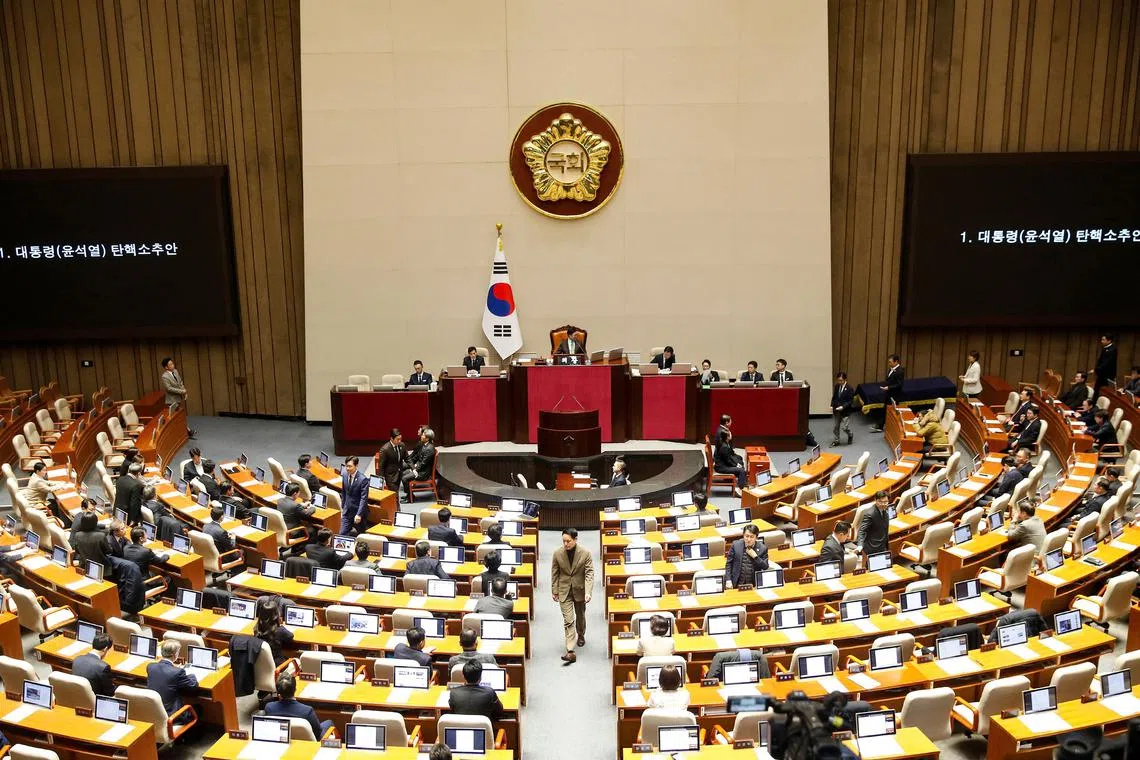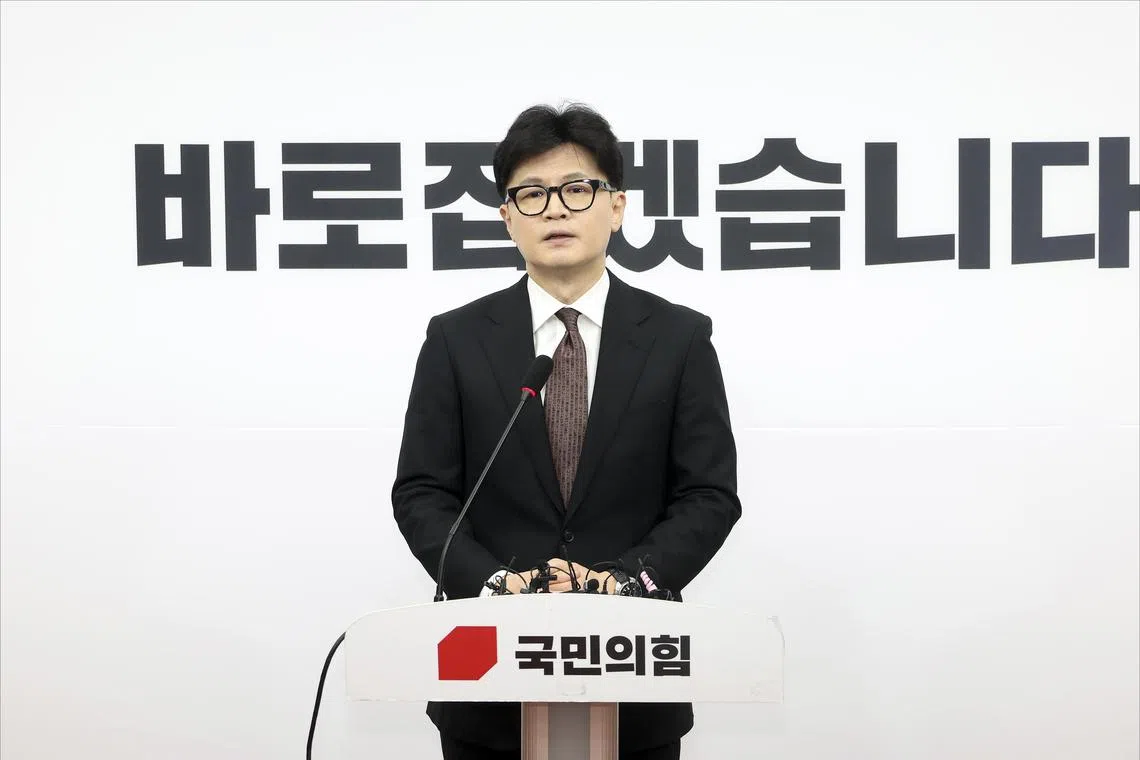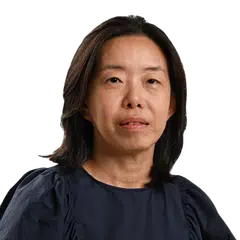News analysis
S. Korean ruling party in disarray after impeachment but split unlikely before presidential election
Sign up now: Get insights on Asia's fast-moving developments

South Korean lawmakers casting their votes for the impeachment of President Yoon Suk Yeol at the National Assembly in Seoul on Dec 14.
PHOTO: AFP
SEOUL - Is it all over for South Korea’s ruling People Power Party (PPP)?
Despite the deep rift within the party following President Yoon Suk Yeol’s declaration of martial law on Dec 3 and his subsequent impeachment,
Whether it can win the election to stay in power is a less certain prospect.
The PPP’s fracture came to the fore on Dec 14,
Right after the motion was passed, five members of the party’s supreme council announced their resignation, effectively leading to the collapse of the party’s leadership.
Two days later, party chief Han Dong-hoon announced his resignation from the post
Floor leader Kweon Seong-dong, who was newly appointed as such on Dec 12, is now the interim party leader, facing the urgent task of appointing members to an emergency response committee to steer the party forward.
However, this fault line in the party, between Mr Han and his faction that had supported the impeachment, and Mr Yoon’s supporters, is unlikely to widen into a splintering of the PPP.
“There is more of an imperative to stay as one political party than to split into the Han faction, which is very small, and the Yoon faction,” said Professor Kim Jae-chun, dean of Sogang University’s Graduate School of International Studies.
“If the Han faction leaves, they will not stand as a formidable force on their own. So I think both sides understand this, and the need to stay united for a political future,” he added.
The party’s rift had intensified in the days leading up to the Dec 14 impeachment vote, as Mr Han angered many in the party for his reversal from the party stance of voting as a bloc against the impeachment motion, a position he had held just a week earlier.
A general party meeting he presided over on Dec 12 descended into a shouting match between Mr Han and anti-impeachment party members that was broadcast live on TV.
The ruling party was trying to avoid Mr Yoon’s impeachment in a bid to cling on to power, as it would lead to a snap presidential election that opposition leader Lee Jae-myung was seen as highly likely to win. The latter lost to Mr Yoon in the 2022 presidential election
But Mr Han changed his mind after Mr Yoon’s defiant national address on Dec 12, during which he said he would “fight to the end”, reneging on his word given on Dec 7 – when he apologised in a national address – to take a step back and defer to the ruling party’s decision-making.
An affronted Mr Han then called for party lawmakers to vote with their conscience and remove Mr Yoon from his duties as soon as possible.

South Korea’s ruling People Power Party chief Han Dong-hoon announced his resignation from the post on Dec 16.
PHOTO: EPA-EFE
While the opposition-led motion needed only eight ruling party lawmakers to vote for the impeachment, the Dec 14 results of the secret vote showed at least 12 PPP lawmakers doing so, with three abstentions and eight voided votes.
This means that the ruling party technically had 23 defectors, and not just 12, noted Kyonggi University professor of political science and law Hahm Sung-deuk.
He pointed out that this was the same number of PPP lawmakers who voted on Dec 10 for the appointment of a permanent special counsel to investigate treason charges against Mr Yoon, a motion on which the PPP lawmakers were allowed to vote freely.
Prof Hahm described the 23 defectors as “young Turks” in the party who have more progressive views and are clashing with the PPP’s “old tigers”, who are determined not to have a second conservative president in a row impeached.
Former president Park Geun-hye was impeached in December 2016 and ousted in March 2017 for her role in a corruption scandal involving her close friend Choi Soon-sil and high-profile Korean conglomerates. The liberal Moon Jae-in was voted in as her successor in 2017.
“In terms of scope and nature of crime, Mr Yoon’s case is far more serious because he invoked martial law. He is also on weaker ground because he lacks the kind of support base and political legacy that Ms Park had,” said Prof Hahm, adding that while the young Turks appear to have realised this, the old tigers are either not seeing this or are refusing to.
Ms Park was elected in 2012, riding on support for her father, South Korea’s third president Park Chung-hee, who was assassinated in 1979. His wife, Ms Park’s mother, was killed five years earlier in an earlier assassination attempt against him.
Prof Kim from Sogang thinks that the party’s rift will not be an easy one to heal, and that any upcoming presidential election will be “lopsided” in favour of opposition leader Lee.
“The PPP is in a precarious position right now, because by failing to support the impeachment, they are now branded as the party that supported Mr Yoon’s martial law declaration,” he told The Straits Times.
“If we are talking about an election five years from today, then perhaps there will only be a lingering memory left of the impeachment and martial law declaration. But we are looking at early next year, like March or April,” said Prof Kim.
Prof Hahm, however, is optimistic that the game is not yet over for the PPP.
The key to winning the election is in winning over moderate voters, who make up a third of the populace, he says, adding that the PPP’s young Turk lawmakers may have won the hearts of the moderates by defecting from the party line and voting for the impeachment.
“To win the support of the moderates, politicians have to prove that they are doing the right things for the country, not for the party and not for themselves,” said Prof Hahm.
He believes that once the impeachment of Mr Yoon is out of the way, the public outcry will subside in the months to come.
“The dynamics of South Korean politics is that things can change very quickly. Now the people are all very angry with Mr Yoon for bringing shame and tarnishing the image of our country, but the storm will pass in two months or so.”



